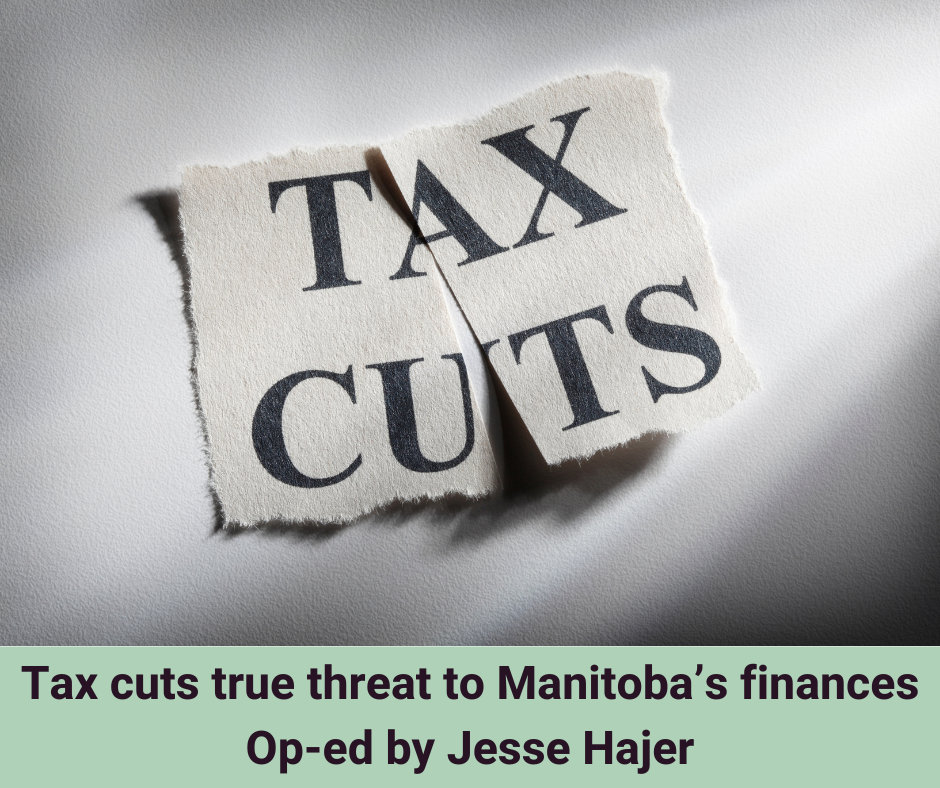Previously published in the Winnipeg Free Press December 18, 2023

Given the recent historic swing in the projected government deficit, Manitobans would be forgiven for thinking they must have missed the onset of some major natural disaster or new global financial crisis. The province of Manitoba’s Second Quarter Report, when compared to Budget 2023, saw the projected deficit grow by $1.25 billion dollars. To put this number in perspective, Manitoba’s books took a $1.9 billion hit in 2020/21 with the onset of the COVID-19 pandemic and the historic recession that shortly followed.
There are three main contributors to this massive increase in the projected deficit. The first is a $610 million fall in projected Manitoba Hydro revenues. While certainly a negative development, Manitobans should not be losing too much sleep over this. Hydro’s ability to make money depends on the weather, and in low-water years the utility will not generate much if any net revenue for the provincial coffers. The hope is that the high-water years will more than offset the low, and Manitoba Hydro will continue to have a positive impact on the province’s bottom line in the long run. Fluctuations like these are important reminders as to why forcing the government to balance the budget in any particular year is a bad idea, and why investments in water storage capacity and alternative energy infrastructure are important given the impacts of climate change.
The second major source of the larger projected deficit is renegotiated compensation agreements in health care, with salaries and expenses increasing by $566 million. This should come as no surprise. Under the Progressive Conservatives (PCs), wages were effectively frozen across the public sector, with the predictable consequence of workers leaving for the private sector and other provinces, worsening working conditions and generating widespread staffing shortages in key public services. Facing a debilitating vacancy problem, public sector workers willing to strike, rock-bottom public approval numbers, and an impending election, the PCs scrambled to settle agreements that started to make up for some of this lost ground. There will be more of this to come as other public sector workers seek to pull themselves out of the hole created by the wage freeze and worsened by the high and rising cost of living.
The final major contributor to the higher deficit projected in the second quarter report is a $420 million decrease in forecasted tax revenues, due to a slowdown in the economy. This claim is puzzling, as economic growth in the second quarter report is still projected to be higher than forecast in Budget 2023. Since revenues closely track economic growth, one would expect revenues to be higher, not lower. The province points to the fact that actual revenues received to date from 2022 tax returns have been lower than expected. This only begs the question, since economic growth going back two years has solidly outperformed provincial forecasts. Why are tax revenues lower than expected when the economy has been consistently outperforming expectations?
What is known for certain is that large tax cuts were implemented in Budget 2023, coincidentally in the area where large negative revisions to the revenue forecast are now being made. Could these tax cuts cost Manitoba even more than projected? The personal and corporate tax cuts were already budgeted to cost the province nearly half a billion dollars in revenue, providing large breaks for high income earners, much less for middle income families, and very little if anything for those at the bottom. Premier Wab Kinew recently doubled-down on keeping these tax cuts, despite the massive increase in the projected deficit and growing calls to reverse the cuts.
Borrowing money to give tax cuts to the rich is terrible public policy, particularly given the state of public services, and with low and modest income households struggling with inflation and high interest rates. Public opinion polling shows that most Manitobans would rather see money invested in repairing public services instead of tax cuts.
Premier Kinew has replied that “the previous PC government lacked a steady hand when it came to the fiscal management of the province” suggesting “we have to be steady; we have to be calm”. The reality is that the $1.6 billion dollars in tax cuts implemented by the PCs has left the province with a structural deficit and are unsustainable without worsening the crisis in health and other social services. One could argue that when about to drive off a (fiscal) cliff, instead of a steady-as-she-goes approach, it may be time to act with urgency and alter course.
Jesse Hajer is an assistant professor of Economics and Labour Studies at the University of Manitoba and research associate with the Canadian Centre for Policy Alternatives – Manitoba.


